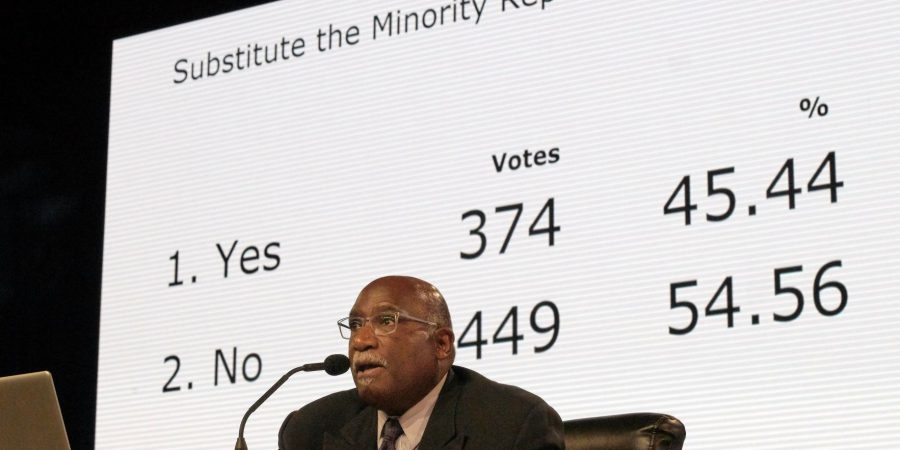The Book of Discipline states that “the practice of homosexuality is incompatible with Christian teaching”...
Dissent from Traditional Plan dominates United Methodists’ top court meeting

But questions about that plan still dominated the Judicial Council meeting this past week in suburban Evanston, Illinois.
“The matters before us are neither academic nor abstract. They are where we and the church live,” Bishop Kenneth H. Carter, president of the denomination’s Council of Bishops, said during an Oct. 30 public hearing, according to United Methodist News Service reports.
“This impacts persons who are called to ministry and persons who are served by them.”
RELATED: United Methodists float plans to split denomination after LGBTQ vote
The Council of Bishops had asked the Judicial Council to decide the “constitutionality, meaning, application and effect” of several petitions adopted as part of the Traditional Plan by a special session of the General Conference, the denomination’s decision-making body, held in February in St. Louis.
The Book of Discipline states that “the practice of homosexuality is incompatible with Christian teaching” and that “self-avowed practicing homosexuals” cannot be ordained as ministers, appointed to serve or be married in the church.
The Traditional Plan further defines a “self-avowed practicing homosexual” as a person who is “living in a same-sex marriage, domestic partnership or civil union or is a person who publicly states she or he is a practicing homosexual.”
The plan also bars bishops from consecrating, ordaining or commissioning “self-avowed practicing homosexuals” even if they have been elected or approved by the appropriate church body. It prohibits those church bodies from approving or recommending them as candidates, as well.
It also strengthens current complaint procedures and penalties in the Book of Discipline. A clergy member who performs a same-sex wedding will face a minimum one-year suspension without pay for the first offense and a loss of credentials for the second.
In April, the Methodist’s high court ruled that the plan was passed was constitutional. But the denomination’s bishops have their doubts.
The bishop petitioned the court about several details of the plan. Specifically, they wanted to know if the Tradition Plan’s definition of a “self-avowed practicing homosexual” is constitutional. And they wanted to know if that plan applies to current clergy who had been approved under previous versions of the rules.
For now, the court did not issue an opinion.
The court also left legislation in place that allows churches that leave the denomination to keep their property, saying that legislation went into effect at the close of the special session in February.
The legislation has been controversial because of allegations of improper voting during February’s general conference.
In August, the Commission on General Conference determined that four people may have voted using the credentials of delegates who were not at the special session.
Those allegedly invalid votes are significant since the rules allowing departing churches to keep their property were approved by a tw0 vote margin. The Judicial Council said it will wait till next year to decide whether or not the improper voting means the rules on departing churches should be invalidated.
During a hearing, the Rev. Thomas Lambrecht, vice president of conservative advocacy group Good News and one of the authors of the Traditional Plan, said the court risked undermining the outcome of the special session.
“If we continue to raise these issues, it gives the impression that people are not willing to accept the outcome of General Conference,” Lambrecht said.
But opposition to the Traditional Plan is likely to continue, no matter what the court rules.
A number of moderate and progressive United Methodist groups in the U.S. have vowed to resist the Traditional Plan. Those groups includes the LGBTQ-affirming Reconciling Ministries Network, which has urged its members to “stand your holy ground.”
Several United Methodist regional bodies — known as annual conferences — have passed resolutions saying they will not comply with the Traditional Plan. The court was asked to rule on the constitutionality of some of those resolutions.
Among those resolutions:
The Mountain Sky Annual Conference — which includes Colorado, Montana, Wyoming, Utah and one church in Idaho — resolved that its members “cannot and will not comply with the strict requirements of the Traditional Plan.” The court ruled that resolution unconstitutional.
The California-Pacific Annual Conference similarly resolved it “will not conform to, comply, or cooperate with any provisions of the Traditional Plan, unconstitutional or otherwise.” The court also ruled that unconstitutional.
The Upper New York Annual Conference declared the Traditional Plan “unacceptable” and called on the 2020 General Conference to adopt a plan that creates an expression of Methodism that allows for both “traditional” and “progressive” understandings to exist within the denomination. The court rejected part of its action that strongly recommended the conference refrain from spending money on background investigations, clergy trials and other actions regarding LGBTQ ordination and marriage.
The Eastern Pennsylvania Conference declared it “considers itself a ‘One Church’ Conference in spirit.” That’s a reference to the unsuccessful One Church Plan, which had been supported by the Council of Bishops and would have allowed churches and annual conferences to decide whether to allow LGBTQ clergy and same-sex marriage. The court ruled it did not have jurisdiction since “no formal decision of law was made,” according to its decision.
The Alaska Annual Conference submitted a list of questions regarding withdrawing from the denomination but was under consideration.
The court said it did not have jurisdiction to answer the questions, calling them “hypothetical, speculative and advisory in nature,” according to its decision.
Read more of XPian News at… https://xpian.news/category/national/




Comments are Closed